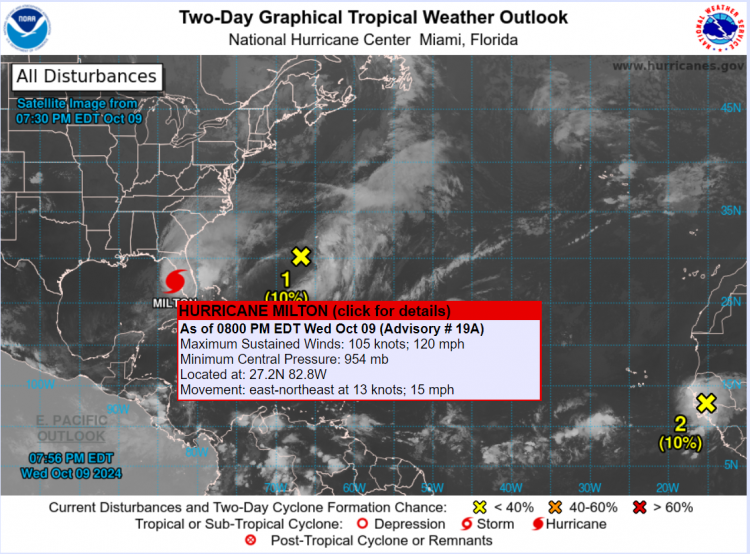Hurricane Milton made its powerful landfall on Florida's Gulf Coast late Wednesday, tearing into the state with maximum sustained winds of 120 mph and triggering a catastrophic series of tornadoes that left more than 1 million people without power. As the storm surged ashore near Siesta Key, about 70 miles south of Tampa, it brought ferocious winds, heavy rain, and a life-threatening storm surge to Florida communities still reeling from the damage inflicted by Hurricane Helene just weeks prior.
Milton struck the Sunshine State as a Category 3 hurricane but quickly began unleashing conditions that were far more devastating than anticipated. The Miami-based National Hurricane Center warned that the storm's impact would be felt across much of Florida's Gulf Coast, affecting densely populated areas like Tampa, St. Petersburg, Sarasota, and Fort Myers. Tornadoes touched down in several regions, including St. Lucie County, where local authorities reported multiple fatalities.
"This is it, folks," said Cathie Perkins, emergency management director for Pinellas County. "Those of you who were punched during Hurricane Helene, this is going to be a knockout. You need to get out, and you need to get out now." Despite these dire warnings, many residents found themselves trapped as conditions deteriorated rapidly, forcing officials to suspend emergency services and focus on the unfolding disaster.
The violent tornado outbreak that accompanied Milton's landfall was one of the most severe on record for Florida. More than 140 tornado warnings were issued throughout the state, with funnel clouds spotted in areas like Palm Beach County and Fort Myers. Videos shared on social media captured scenes of chaos, showing large tornadoes ripping through neighborhoods, uprooting trees, and causing widespread destruction.
"The extent of the tornado damage was unlike anything we've seen in recent years," said Brandy Campbell, a FOX Weather Correspondent on the scene in Fort Myers, where first responders were seen rushing to aid injured residents amid the debris-strewn streets.
As Hurricane Milton continued to churn across Florida, more than 1 million homes and businesses were left without electricity, primarily in Sarasota and Manatee counties. The storm's force also caused significant structural damage before even making landfall, with approximately 125 homes destroyed, many of them mobile homes in senior communities, according to Kevin Guthrie, director of the Florida Division of Emergency Management.
In addition to the direct impact of the storm, Milton's powerful outer bands generated flash floods that inundated regions like the Tampa metro area. Within just a few hours, more than 10 inches of rain had fallen, leading to widespread flooding and further complicating rescue efforts. The Sunshine Skyway Bridge and other major roadways were closed, cutting off critical routes for both evacuation and emergency response.
Governor Ron DeSantis addressed the state in a news conference from Tallahassee, emphasizing the deployment of extensive resources, including 9,000 National Guard members, over 50,000 utility workers from across the country, and police escorts for fuel deliveries to help with evacuation efforts. "Unfortunately, there will be fatalities. I don't think there's any way around that," DeSantis warned as he urged residents to take every possible precaution.
The storm's impact has been particularly devastating for communities already battered by Hurricane Helene, which left a trail of destruction just two weeks earlier. In many coastal areas, debris from Helene had not yet been cleared, and Milton's powerful winds and storm surge only exacerbated the damage. Municipal workers raced to remove the wreckage in anticipation of the storm, but the overwhelming force of Milton has set back recovery efforts significantly.
For some residents, like Jackie Curnick from Sarasota, the decision to stay put was not made lightly. "We started packing on Monday to evacuate, but we couldn't find any available hotel rooms, and the few we did find were too expensive," said Curnick, who is expecting her second child later this month. "There were too many unanswered questions if we left: Where to sleep, if we'd find gas, or even a safe route out of the state."
The aftermath of Milton's landfall saw airlines canceling nearly 2,000 flights, and major theme parks like Walt Disney World and Universal Orlando shutting their doors. Gas shortages plagued the Tampa and St. Petersburg areas, where over 60% of gas stations ran dry as residents scrambled to stock up before the storm's arrival.
In the face of this devastation, local leaders like St. Petersburg Mayor Ken Welch warned residents to brace for extended power outages and possible sewage system failures. "We're expecting a long road to recovery," Welch said, emphasizing that the city's resources would be stretched thin in the coming days.




